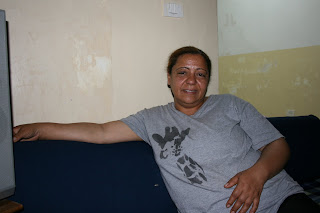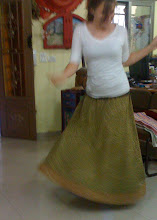
If I were to judge the success of the past two months based on how I envisioned it then, I think it would probably be safe to say I am a complete failure. As of May 5, 2009, as my flight left, I was on a mission to collect oral histories from members of the Domari community, in relation to understanding their interaction as a community in the unique city of Jerusalem, while volunteering at the center by teaching English. That, I did not do.
After the first two days, I realized that there was an entire back story that was going to drastically shift my relationship with the center. I found out that the perfected English of her past emails was not hers', but that of a Polish volunteer that had left. In reality, the English that Amoun had learned on the street was just that- street English. She couldn't write an email, or update the website. Since that time, anything related to proposal writing, answering emails, drafting updates, writing the newsletter, was waiting for someone else to come along. But it was okay- the Polish volunteer, Kaisa, was going to come back- at that point, I could remove myself from the administrative stuff, and get back to focusing on my project and teaching English.
But just kidding. Kaisa then decided that she wasn't coming back. And she left no records of what she had done for the center in the last year- financial information, what proposals had been submitted, who she was in contact with, how to access the website (which she decided not to do the entire year that she was there).
As it became clearer how limited Amoun's computer and written communication skills were, I realized that she had relied completely on Kaisa to keep records, information, emails, etc. And she hadn't done it. As a result, the proposals for funds were horribly written, outdated, financial records barely kept, computer files a mess. And Amoun expected me to fix it. There were times I wanted to pull my hair out because she expected me to fix a years' worth of sloppiness, and didn't understand why I wasn't comfortable fudging financial information they had failed to keep records on, or that I witnessed were different than what was being reported. It wasn't intentional- Amoun's complete reliance on others made her extremely suseptible to this, though. Plus, I was amazed this wasn't something the center had run into before, relying completely on volunteers to do such critical work for a non-profit.
I'll be honest, I was kind of pissed, particularly since she has REFUSED to help me with this project, while she had promised to translate what I couldn't and recruit people. I felt abused, and there were days when I just wanted to give up. I had not signed up for this, and while I was more than willing to help, she wasn't doing her part, throwing me into fits of panic.
I decided to evolve my project, and while I'm still disappointed the oral histories didn't work out, when I realized the real reasons WHY it didn't, it was just as enlightening as if it had.
The reason I chose this community (outside of being in Jerusalem) was because I thought they would be open to this sort of project. I based this off of news articles, comments, and information shared by Amoun, stating how the community wanted to show the world their true colors, to dispand the wrongful stereotypes surrounding them. What better way to do that than with oral histories, an easy way to reach out and tell your stories? Since I laid out the first four weeks as a part of becoming acquainted with the community, I saw that I was not the only one interested in this unique story- documentarians, photographers, journalists, all stopped into the center, wanting to get an interview, photograph the community, share her story as a female fighting years of patriarchal society and societal oppression. Yet all she turned away, or only gave them an interview after the urging of a board member. Even then, it was the standard line found in ALL the news articles- as I listened to each one, I thought I was listening to a broken tape recorder. I was slightly confused- how was this opening up the community to the outside world? Futher, these were professional documentarians and photographers offering their services for free. And then I realized that Amoun had agreed to help me because she needed my help- and that actually getting her to uphold her end was going to be an uphill (and probably unsuccessful) battle. Up goes in smoke my critical component to making this happen.
When this became clear to me, I re-oriented my project, looking more at the current engagement with the municipality Amoun, as the center director, is having. At the beginning of the month, she had a meeting with Mayor Nir Barkat, who committed to finding a way to improve the situation of the Gypsies. I became intrigued in how this group would work to achieve that, particularly since how the Jerusalem municipality works concerning East and West Jerusalem is so convoluted and bizarre. How would this community, straddling the political and economical divisions, achieve their goals (separate post some other time)?
Anyway, it became clear that Amoun is teetering precariously on cultural boundaries, and THAT was why she was avoiding, as much as possible, my project. In reality, while she may say the community is ready to open up, you are only talking about 10%--aka, her family. While they want the services and funds she brings them, they are not interested in the rest. The reason is twofold: one, identifying as Gypsy in the community is a source of pride, but to others brings issues of discrimination- hence their advanced assimilation into Arab society. Two, she is a woman. What she is doing does not jive well in am entrenched, patriarchical society. Her brothers- people I admire, grew friends with, know she is the breadwinner (indicated by how she is the first to sit at the table during a meal, and they call to let her know what they are doing), but still enforce authority when they can. It is not a part of their culture to share with the outside world, and Amoun is breaking with that- at a price. This mirrors the constant culture clash that the 10% deals with wihtin the community and in their interactions with others- being a part of Arab culture, yet not accepted, compounded by their relationship with Jewish Israel. Good example: Amoun faced the potential of being branded a 'collaborator' by the Palestinians, her neighbors, because of her meeting with Nir Barkat, and was concerned about information about it getting out. It is constantly her culture, the culture she is surrounded by, clashing with those who have the means to acheive what her community needs.
Further, I think it is an issue of pride for Amoun. She hand-picked who she would let me talk to, and it was by far the most educated. Certain brothers and sisters were off limits- they were too 'simple' for this kind of thing, and would be of no use (despite my protests otherwise).
Another limitation on the direction I wanted to go was an internal feud between Amoun and the mucktar, or British-designated leader, of the community. She, and what she does, challenges his authority- despite the fact he does nothing positive for the community, outside of charging them to translate their governmental documents into Hebrew. I cut myself off to anyone on his side from the beginning simply by associating with Amoun. When Amoun went around with a researcher around 2000 to collect information, he started rumors about her, damaging her reputation (everything for a woman here, particularly since she is not married) and demanding people not participate. I was definitely not interested in putting her through that again.
I mean, I can't say this was the case for sure- but I got more than most people, sitting down with her sisters and brothers, than anyone else outside of a researcher who has worked with the community for years, and while they were so few, and hardly a picture of the whole community I was hoping for, it was a step. I learned SO much about Jerusalem, the Domari, and subject matters I hadn't anticipated. There is success in that, for sure.
I can go on talking about this forever, but I think I'll wait until I am able to put it into a more cohesive flow. In summary, I think I learned more from not achieving exactly what I wanted than if I had. Amoun and I had culture clashes of our own- which maneuvering and overcoming were a huge part of my education here.
PS I was still able to do a lot with identity and academic-oriented frameworking, so I'll put snippets of that together for a post eventually. Also, some parts of the interviews shall be posted for your viewing pleasure. Hope no one gets bored to death :)
 My flight for Nairobi, Kenya leaves tomorrow night. And I am completely psyched about it. Tonight, a friend who is doing a journalism project on Sudanese refugees in Israel, invited me to a dinner at the home of an individual named Gabriel, who happened to be the nephew of the infamous leader, Dr. John Gurang, of the Southern People's Liberation Army. After decades of civil war in Sudan, the Comprehensive Peace Agreement of 2005 stalled the fighting of the second Civil War between the Muslim/Arab north and the Christian/Animistic south (throw in oil revenues to complicate it all), giving the south autonomy for six years, and a role in the northern government. In 2011 there will be a referendum that will decide the future of the south. Gabriel, and his friends I met, are in Israel after fleeing political persecution in Sudan and Egypt. Type 'Comprehensive Peace Agreement' into the search engine and you'll get more information than you'll ever need.
My flight for Nairobi, Kenya leaves tomorrow night. And I am completely psyched about it. Tonight, a friend who is doing a journalism project on Sudanese refugees in Israel, invited me to a dinner at the home of an individual named Gabriel, who happened to be the nephew of the infamous leader, Dr. John Gurang, of the Southern People's Liberation Army. After decades of civil war in Sudan, the Comprehensive Peace Agreement of 2005 stalled the fighting of the second Civil War between the Muslim/Arab north and the Christian/Animistic south (throw in oil revenues to complicate it all), giving the south autonomy for six years, and a role in the northern government. In 2011 there will be a referendum that will decide the future of the south. Gabriel, and his friends I met, are in Israel after fleeing political persecution in Sudan and Egypt. Type 'Comprehensive Peace Agreement' into the search engine and you'll get more information than you'll ever need.









